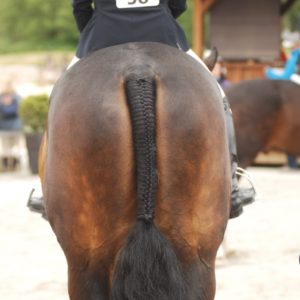#MasterclassMonday is a collaboration between Horse Network and NOELLEFLOYD.com to empower equestrians. Every Monday we’ll bring you a new lesson from a leading trainer to help you troubleshoot your training, master your mindset and up your game. This month’s featured rider: Chelsea Canedy.
There’s a truth about horses and how they exist in the world that most of us know, but don’t really understand. It’s a simple idea that we’ve heard but often aren’t sure what to do with in our daily training.
And that is, horses think and exist in the present.
They think and exist in a much smaller timespan than humans do, because humans have a huge capacity for mental processing. We think in a broader time frame, incorporating more of the past and future into how we think, react, feel, and view the world. How often do you find yourself thinking about something that happened in the past, or something that might happen in the future? Many of us struggle to stay in the present, which can make it difficult to relate to our horses, who really only exist in the now.
Horses are prey animals by nature. They do what they need to do to survive and always be half an ear or half an eye on alert for a predator that might find them. That’s why, when something disrupts their environment, horses have really big reactions. Their instinct kicks in and tells them to flee.
Humans, however, are the top of the food chain, so we don’t have to be alert at all times. We can live a little in the past, a little in the future, and actually shut out what is happening around us in the moment.
So, why does this matter so much for our training?
1. If you’re just going through the motions without being present and observant, you’re missing the subtle cues that your horse is trying to send you about his understanding of what you are asking.
2. Your ability to read those small cues and moments of body language (your horse’s form of communication) is what solidifies your partnership and helps your horse feel that he’s heard by his teammate.
3. When we’re not present, we can miss small signals of misunderstanding or confusion, which might be minor issues that we could address before they turn into larger ones. If we miss those signals, it may seems like all of a sudden there is a behavioral issue or a major roadblock in your training that:
- You may not understand because you missed the smaller signals that something was brewing.
- Catches you by surprise and causes you to lose confidence, trust in your horse, etc.
If it feels like you and your horse are speaking different languages, it could be because you’re missing each other in that small circle of “present”—and that’s where, to be successful, you must learn to meet your horse.
Want to hear more? Learn how to show up mentally and emotionally for your horse with Chelsea Canedy.




 April 4, 2022
April 4, 2022 






















